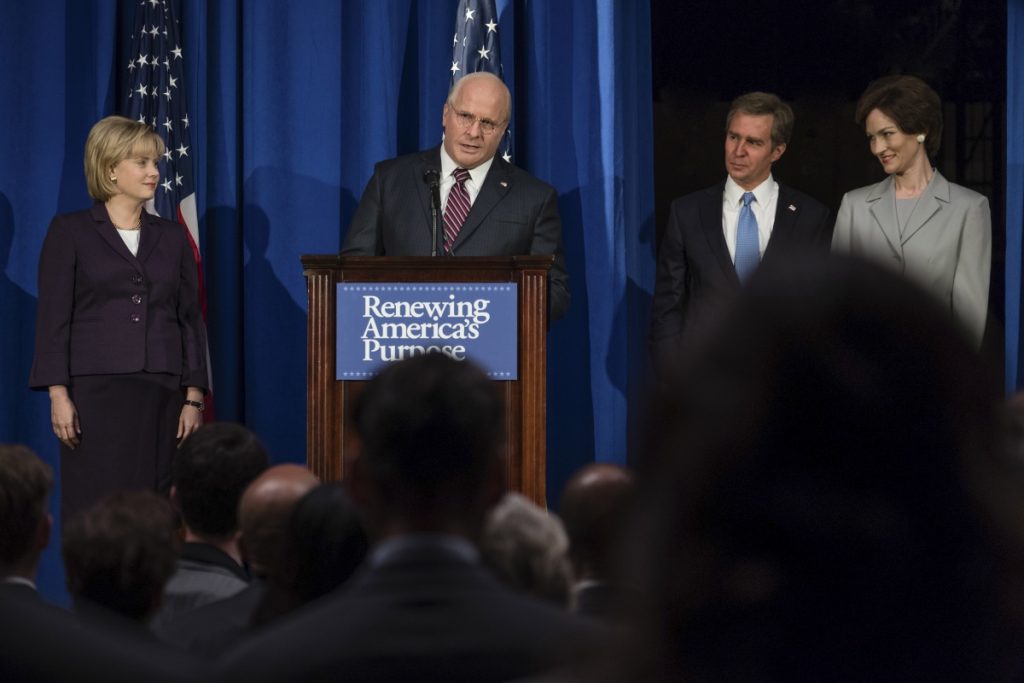Vice (2018)

Written and directed by Adam McKay, who impressed in his last effort from 2015, The Big Short, Vice is specifically a biopic of sorts about former Vice President of the United States under George W. Bush, Dick Cheney — both of whom were seen as responsible for the policies that brought about the stock market crash covered so well in McKay’s prior film. McKay covers Cheney’s rise from drunken slob, to shaping up by entering Wyoming business and politics, to becoming a power player in the Republican party in Washington (Chief of Staff under President Ford), to his failed ambition to become president, to becoming the CEO of Halliburton. However, some would say that, after a successful bed on the bottom of the ticket for the 2000 and 2004 elections, he found a way, dubbed the Unitary Executive Theory, to become the most powerful nation in the world from the number-two position despite it being seen as a do-nothing office.
It’s been a while since Oliver Stone has delivered apolitical hatchet piece worth watching, and here to fill the void is McKay, whose politics can be seen all over this biopic, but offers much more tongue-in-cheek verve in his delivery. Playing fast and loose seems to have taken effect, not only in the adherence to real conversations among the main characters, but also in the overall tone, in which McKay uses cutaways and employing side skits with conversations within conversations in a manner in which he is always guiding, massaging, and intruding upon with his own commentary throughout. Much of this works well with The Big Short, primarily because the financial market and its machinations are so dry and complex that the simplified and humorous approach is appreciated in order to give us the minimal understanding of what’s going on. In Vice, we know all of these players and, for those who are alive or know their history, we know most of these newsworthy events. We don’t need jokes or explanations to sell the film to us because we want an understanding of what’s going on that rings as authentic, which is something that McKay rarely strives for in place of goosing the material for verve and audacity.
Vice proves to be a wildly uneven experience, admirable in some respects in terms of its performances and its daring attitude toward its history, especially when you consider all of the politicians depicted are still living. In the end, what we’ve learned is that Dick Cheney is a slimy S.O.B., and the current political structure of the United States, the Constitution, and its convenient interpretations has vulnerabilities that allow for slimy S.O.B.’s to take advantage of them. Those with wealth and power can take advantage of these vulnerabilities in order to shield the American public from knowing the truth, while filling that vacuum with misinformation to tell them whatever is necessary to get them on board with military actions or policy decisions that often run counter to their own interests. While generally a hit piece, the film doesn’t show Cheney as absolutely evil, especially in his close relationship with his wife and family, especially in how he would support his lesbian daughter, Mary, while speaking out of the other side of his mouth publicly by opposing LGBT rights.
Obviously, much will be said about Christian Bale’s performance, and his 45-pound weight gain for the role (which must be old hat for him by this point), eerily accurate in his speech and mannerisms many respects, even if the abundance of prosthetic make-up involved in making him look like the older Dick Cheney has him appear more like Karl Rove Unfortunately, , despite Bale fully inhabiting Cheney in body and quirky mannerisms, we don’t get much more to sink into than that. We get moments from Cheney’s early life, but really nothing within those moments gives us much indication of who he really is and what makes him tick, or even how those early experiences shaped and dominated his thinking while a major player in the U.S. government.
Amy Adams plays Lynne, Dick Cheney’s loyal wife, who gets likened to Lady Macbeth enough by McKay that he actually gives them dialogue from the Shakespeare lay to perform upon contemplating his rise to power. Steve Carell gets a sizable supporting role (ostensibly to court another Oscar consideration) as Donald Rumsfeld, who shows Cheney the ins and outs of Washington and his philosophy on how to court power. Perhaps the best performance in the bunch belongs to the easiest to get wrong, as Sam Rockwell nails the essence, cadence and personality of George W. Bush without going too far into cartoonish territory.
While I realize that this is an important opinion to mull over, it is also one that discerning observers of politics already know, and those who don’t will likely stay away from Vice altogether due to its strong political slant. In that regard, it is a missed opportunity to open eyes for a segment of the American public that seems oblivious to the machinations of those in power, in this piece that mostly just reinforces attitudes already quite solid going into it. It’s an intriguing endeavor, but the film seems to say too much about McKay and to little about Dick Cheney to come way with much impression beyond the quality of the performances.
Qwipster’s grade: C+
MPAA Rated: R for language and some violent images
Running Time: 132 min.
Cast: Christian Bale, Amy Adams, Steve Carell, Sam Rockwell, Alison Pill, Eddie Marsan, Tyler Perry, Jesse Plemons, Justin Kirk, LisaGay Hamilton
Director: Adam McKay
Screenplay: Adam McKay
